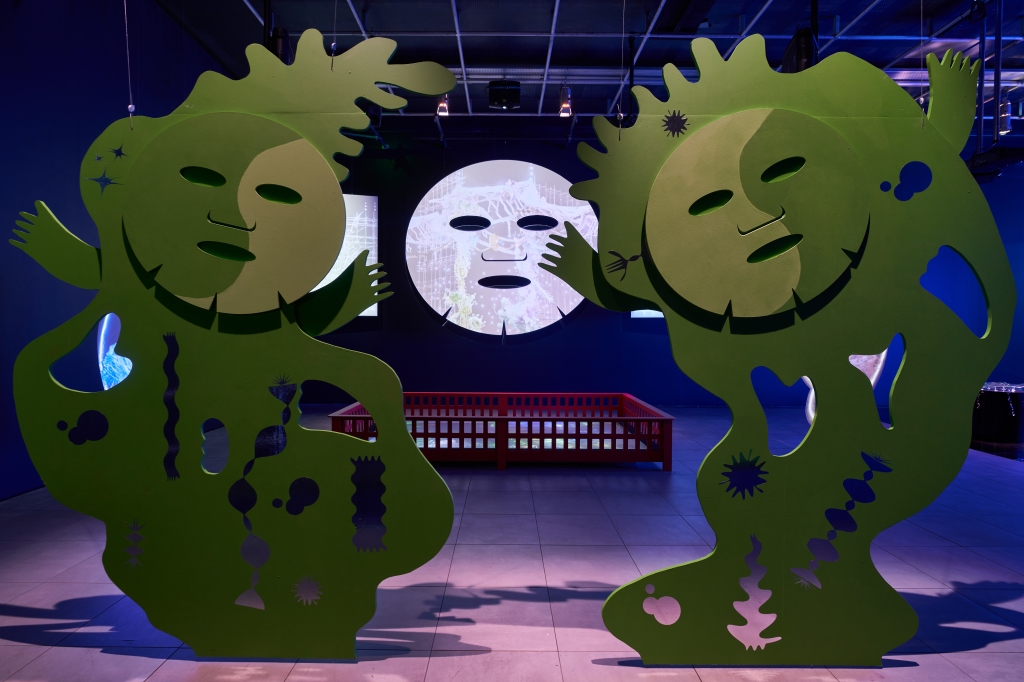At the end of last year, FACT launched the first edition of its online journal with the issue Radical Ancestry, which reflected on our learning from FACT’s Radical Ancestry programme (2021-2023).
FACT’s Radical Ancestry inquiry and artistic programme, spanning 2021 to 2023, was a collective cultural exploration of our sense of belonging and the multifaceted ways in which we understand and construct our identity. Artists and curators were invited to participate through research-based residencies, commissions and participatory projects, which materialised in a series of commissioned artworks, exhibitions, events and other public-facing activities, focused around four major seasons. “Future Ages Will Wonder” (October 2021 to February 2022) , “Let The Song Hold Us” (March to June 2022), “My Garden, My Sanctuary” (21 July – 9 October 2022), and the dual exhibition When Our Worlds Meet by Danielle Brathwaite-Shirley and When the moon dreamed of the ocean by Josèfa Ntjam (December 2022 – April 2023). The programme emphasised the creation of platforms for diverse and marginalised voices, and aimed to evoke thoughtful and affective responses from audiences.






Installation Views at FACT Liverpool. Top L-R; Yarli Allison, In 1875 We Met At the Docks of Liverpool 於梨花埠遇上, 2021. Larissa Sansour and Soren Lind, As If No Misfortune Had Occurred in the Night, 2021. Danielle Brathwaite-Shirley, When Our Worlds Meet, 2022. Bottom L-R: Andrius Arutiunian, The Irresistible Powers of Silent Talking , 2021. Erin Dickson, Harton Moor, 2022. Yaloo, Birthday Garden, 2022. All photos Rob Battersby, except When Our Worlds Meet photo Drew Forsyth.
In the aftermath of the first year of the Covid pandemic, which shifted perceptions of the communities to which we belong – isolating many, highlighting the inequalities and inequities pervading society, and emphasising the role of online technology in our social connections – Radical Ancestry was a timely theme to centre our artistic programme as a collective cultural inquiry. The programme produced a diverse and intricate exchange of ideas, imaginaries, and visions, encompassing powerful critiques of dominant historical narratives and reductive uses of science, poetic explorations of shared memory, ritual and collective experience, and the use of ancestry and storytelling as tools for exploring hybrid and fluid identities and constructing alternative worlds.
In my introductory essay to the journal, ‘Unravelling Identity and Belonging’. I consider the programme’s artistic outputs through two main perspectives: the concept of “traveling through layers” (an Inuit concept of a non-linear approach to time and space) and the role of science and technology in shaping our ideas of identity and ancestry. Traditional repositories of history and knowledge, along with modern technologies such as AI and genetic testing, have the potential to perpetuate stereotypes and reinforce biases. This can narrow and distort the rich potential complexities of our identity and contribute to inequity and social division. In response, the artists and curators in Radical Ancestry sought to rebalance these perspectives by adopting non-linear and inclusive storytelling methods, highlighting the histories, cultures and stories of their own ancestries and those of underrepresented communities, and utilising digital technologies to create alternative archives and shared worlds. Through critical reflections on history, science and colonial legacies, the programme has shown how artistic practices can upturn established norms and narratives, crafting more nuanced visions of who we are and how we belong. It has demonstrated the transformative potential of art in fostering more nuanced visions of identity that embrace the complexity of human experiences and bridge past, present and future, offering glimpses of a more accepting and hopeful future.
The journal can be read on Issuu (as above) or via the FACT website. Alternatively, please contact me for a .pdf copy.
Editing the journal, I felt a little sad that I couldn’t do a similar process for Radical Ancestry Part 1, which took place at Arts Catalyst from 2017 – 2019, a piece of work left unfinished when I left that organisation to take on the leadership of FACT. Perhaps one day …
